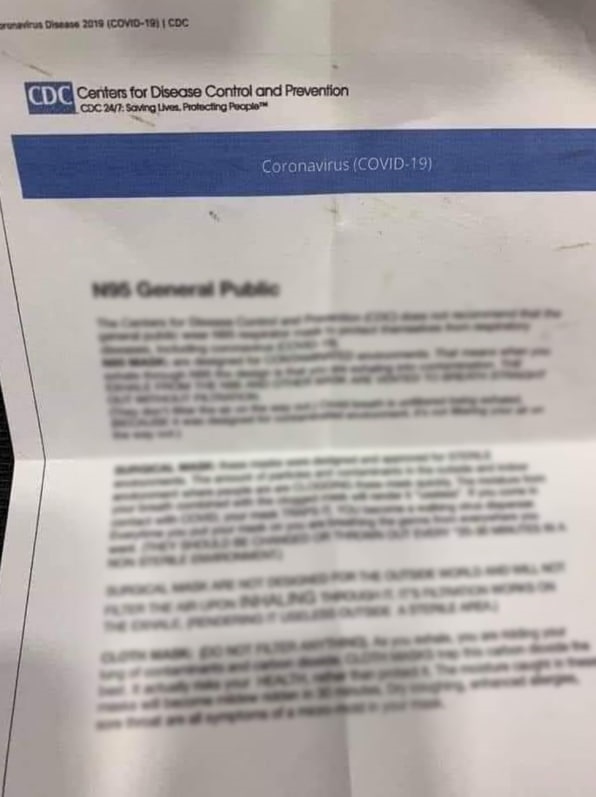The latest pandemic hoax: a fake CDC notice advising against masks
Hoaxsters are pushing fake notices with letterhead pulled from the Centers for Disease Control and Prevention to undermine the use of face masks.
On Thursday, The Daily Beast identified a fraudulent missive, purportedly from the CDC, saying it does not recommend N95 masks as protection against COVID-19 and claiming that other kinds of masks can harm the wearer’s health (a widely debunked falsehood). Reporter Kelly Weill found the fake letter circulating on Reddit, Twitter, Facebook, and other social forums. The viral image comes amid a politicized campaign against wearing masks, which some believe infringes on their personal choice.

So how do you spot a real CDC notice from a fake? Always go directly to the CDC website. The CDC says it does not put out public guidance in letter format. All of the center’s advice, including a COVID-19 symptom checker, is on its website. You can also look to the CDC’s social media accounts for updates as they come out. Do not trust screenshots of supposed official documents from the CDC or other government agencies. Even if a letter is real, it may be out of date and guidance may have changed.
Public health officials largely agree that wearing a mask can meaningfully curb transmission of the coronavirus, regardless of whether that mask is cloth or has the more substantial filtering quality of an N95 mask. As the CDC notes in its own advisories, cloth masks prevent the wearer from transmitting droplets. When two people in masks are interacting with one another, each is protecting the other from transmission.
As far as N95 masks specifically are concerned, the CDC recommends these masks for healthcare workers in particular because of their ability to filter out small particles. However, public health experts have warned average citizens against wearing N95 masks with exhalation valves. Though the N95 mask with an exhalation valve protects the wearer, it exposes others to the wearer’s unfiltered breath. As the CDC notes: “Respirators with exhalation valves should not be used in situations where a sterile field must be maintained (e.g., during an invasive procedure in an operating or procedure room) because the exhalation valve may allow unfiltered exhaled air to escape into the sterile field.”
The spread of fake CDC materials is just one of many campaigns to cast aspersions on COVID-19 and strategies to mitigate its spread. Conspiracy theorists have been hard at work creating articles and videos that sow doubt about the origin of COVID-19, its real impact, and the credibility of Dr. Anthony Fauci, a member of the White House’s coronavirus task force and the director of the National Institute of Allergy and Infectious Disease. These campaigns often use specious experts to foment distrust against the government and public efforts to contain the virus. The most notorious example of this kind of disinformation is a video called Plandemic, which went viral in May and aimed to question the credibility of the U.S. government, public health officials, and an eventual vaccine. The documentary-style video interviews Judy Mikovits, a discredited scientist known for pushing an anti-vaccine agenda.
Some American citizens refuse to wear a mask despite the CDC’s guidance. Roughly 80% of Americans say they wear a mask some or all of the time when they go to a store or business, according to a June 2020 poll by Pew Research. Only a slim 7% say they never wear a mask. While it may not be pervasive, anti-mask sentiment is loud—until recently, the President of the United States refused to wear a mask. Around the country small groups of protesters and individuals have garnered attention for not wearing masks in public and advocating against wearing masks. Some experts say this behavior may be driven by misinformation and disinformation about the virus, though it’s not currently clear how much false information impacts public opinion. Others say that people may be forgoing masks as a psychological reaction to current restrictions put in place.As the 2020 election nears, making the decision to not wear a mask is increasingly a political statement. Ideologically, Republicans are more likely to believe that masks should never be worn. A recent Pew study shows that only 4% of Democrats think that a mask should never or rarely be worn, compared with 23% of Republicans. Republicans are more likely to believe that the virus’s worst impacts are behind us and they are less worried about spreading the virus themselves—fewer than half of those surveyed expressed concern about transmitting COVID-19 or getting the illness themselves. By contrast, Democrats largely believe in wearing a mask and believe that the worst effects of the virus are yet to come.
This politicization of public health measures to stop the coronavirus’s spread and the accompanying disinformation campaigns are primed to increase as we get closer to November.
(48)



